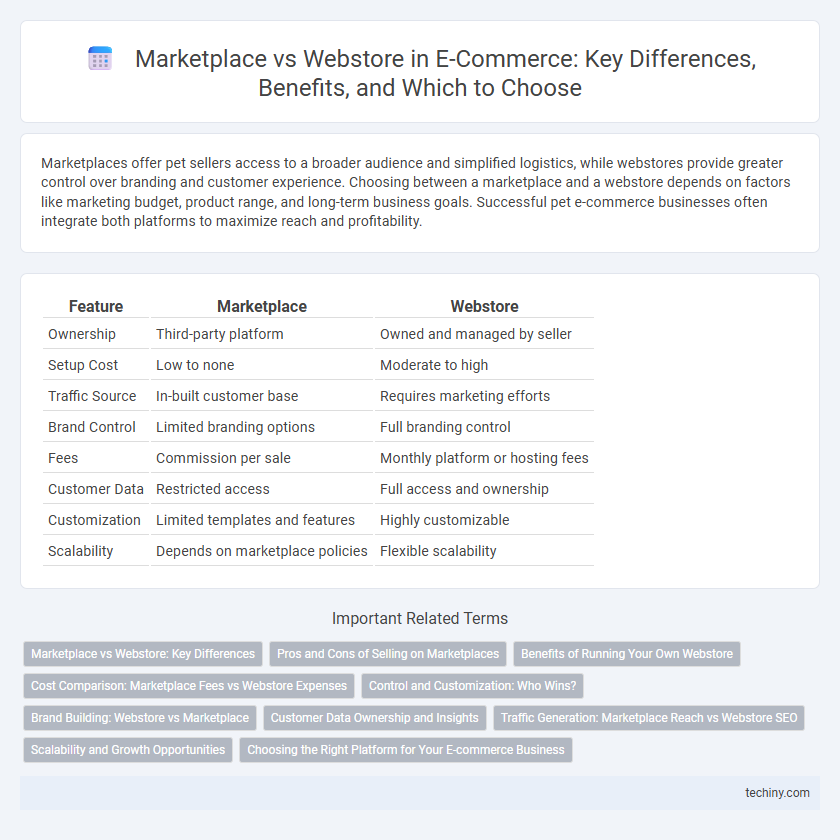Marketplaces offer pet sellers access to a broader audience and simplified logistics, while webstores provide greater control over branding and customer experience. Choosing between a marketplace and a webstore depends on factors like marketing budget, product range, and long-term business goals. Successful pet e-commerce businesses often integrate both platforms to maximize reach and profitability.
Table of Comparison
| Feature | Marketplace | Webstore |
|---|---|---|
| Ownership | Third-party platform | Owned and managed by seller |
| Setup Cost | Low to none | Moderate to high |
| Traffic Source | In-built customer base | Requires marketing efforts |
| Brand Control | Limited branding options | Full branding control |
| Fees | Commission per sale | Monthly platform or hosting fees |
| Customer Data | Restricted access | Full access and ownership |
| Customization | Limited templates and features | Highly customizable |
| Scalability | Depends on marketplace policies | Flexible scalability |
Marketplace vs Webstore: Key Differences
Marketplaces aggregate multiple sellers, offering a wide product variety and higher customer traffic, while webstores are single-brand platforms with complete control over branding, pricing, and customer experience. Marketplaces handle payment processing, shipping, and customer service, reducing operational burden, whereas webstores require merchants to manage these aspects independently. Sellers in marketplaces benefit from built-in audiences but face higher competition and fees, in contrast to webstores that demand more marketing efforts but enable stronger direct customer relationships.
Pros and Cons of Selling on Marketplaces
Selling on marketplaces offers access to vast customer bases and built-in trust, simplifying product discovery and boosting sales potential. However, vendor fees, limited branding opportunities, and high competition can reduce profit margins and control over customer relationships. Marketplaces provide scalability and ease of entry but may constrain customization and long-term brand loyalty development.
Benefits of Running Your Own Webstore
Owning a webstore provides full control over branding, customer experience, and product presentation, essential for building a unique brand identity. It enables direct access to customer data, allowing personalized marketing strategies and improved customer retention. Running a webstore also avoids marketplace fees, maximizing profit margins and ensuring greater pricing flexibility.
Cost Comparison: Marketplace Fees vs Webstore Expenses
Marketplace fees typically include commission rates ranging from 5% to 20% per sale, along with additional charges for listing products or fulfillment services, impacting overall profitability. In contrast, running a webstore involves fixed expenses such as domain registration, hosting, platform subscriptions like Shopify or WooCommerce, payment gateway fees averaging 2.9% plus $0.30 per transaction, and marketing costs that vary by scale. Businesses must weigh predictable webstore overhead against variable marketplace fees when evaluating cost efficiency and long-term financial sustainability.
Control and Customization: Who Wins?
Webstores offer unparalleled control over branding, user experience, and customer data, enabling sellers to customize every element from layout to payment options. Marketplaces limit customization but provide access to a vast audience and built-in trust infrastructure, reducing marketing overhead. For businesses prioritizing full control and tailored customer journeys, webstores win, while marketplaces favor those seeking rapid scale with less effort.
Brand Building: Webstore vs Marketplace
A webstore offers full brand control, allowing businesses to customize the user experience, showcase unique values, and build direct customer relationships. Marketplaces provide vast audiences but often dilute brand identity due to standardized layouts and competitive listings. Prioritizing webstores supports long-term brand loyalty, while marketplaces boost short-term exposure.
Customer Data Ownership and Insights
Marketplace platforms collect and control extensive customer data, limiting sellers' access to detailed insights and ownership, which restricts personalized marketing and customer relationship management. Webstores enable full ownership of customer data, granting businesses direct access to behavioral analytics, purchase history, and preferences, enhancing targeted marketing strategies. Leveraging first-party data from webstores supports improved customer retention and tailored user experiences, driving long-term brand loyalty and revenue growth.
Traffic Generation: Marketplace Reach vs Webstore SEO
Marketplaces benefit from high organic traffic due to their established user base and strong domain authority, facilitating quicker product visibility and sales. Webstores require strategic SEO efforts, including keyword optimization, quality content, and backlink building, to attract targeted visitors and build sustainable traffic over time. While marketplaces offer immediate exposure, webstores enable brand control and long-term customer relationship development through optimized search engine presence.
Scalability and Growth Opportunities
Marketplaces offer extensive scalability by connecting sellers to a broad, established customer base with minimal upfront investment, enabling rapid growth and exposure. Webstores provide greater control over branding and customer experience but require significant effort and resources to scale traffic and sales independently. Leveraging a hybrid approach can maximize growth opportunities by combining marketplace reach with the personalization of a dedicated webstore.
Choosing the Right Platform for Your E-commerce Business
Selecting the right platform for your e-commerce business hinges on understanding the key differences between marketplaces and webstores. Marketplaces like Amazon and eBay provide immediate access to large customer bases and simplified logistics but often come with higher fees and less brand control. Webstores, powered by platforms such as Shopify or WooCommerce, offer complete customization and brand ownership while requiring more investment in marketing and traffic acquisition.
Marketplace vs Webstore Infographic

 techiny.com
techiny.com